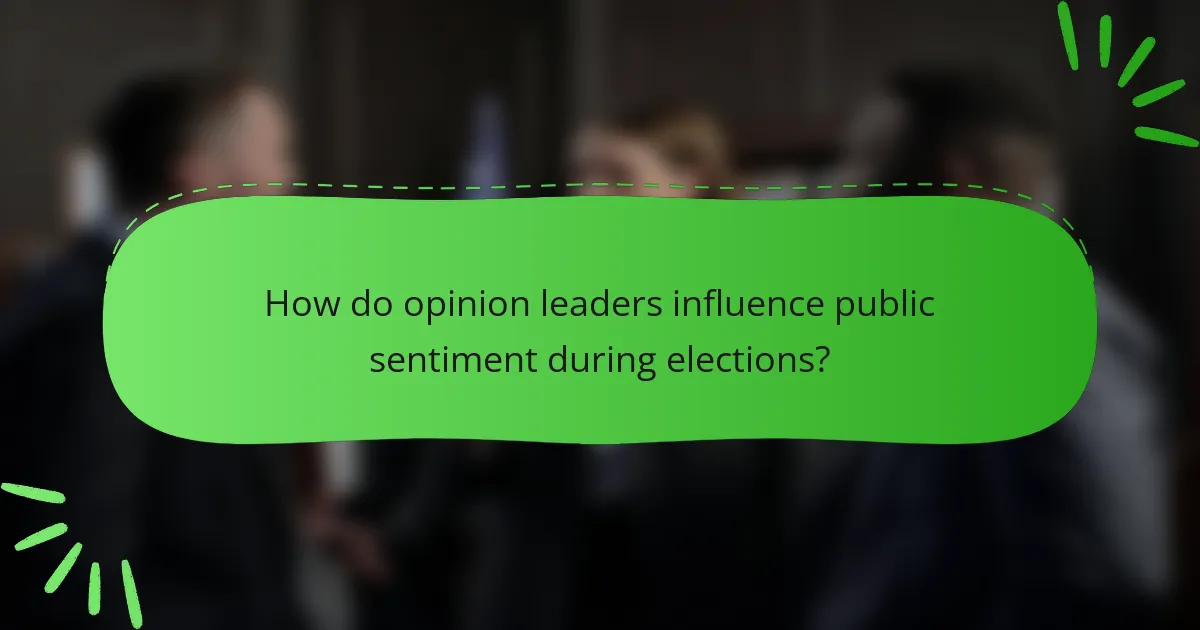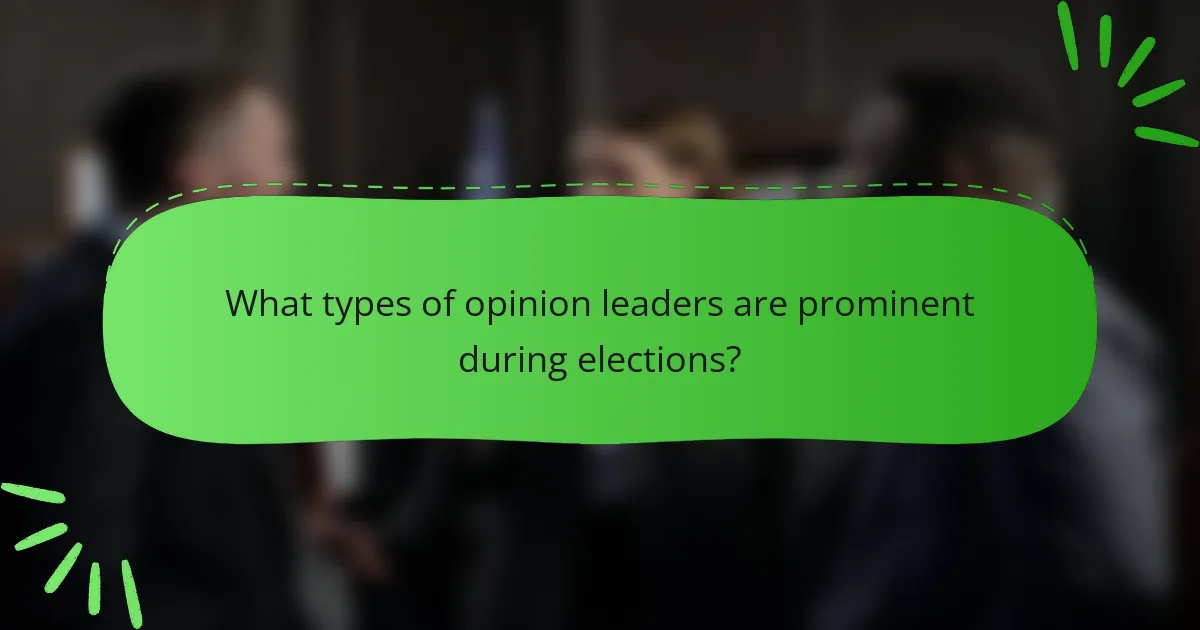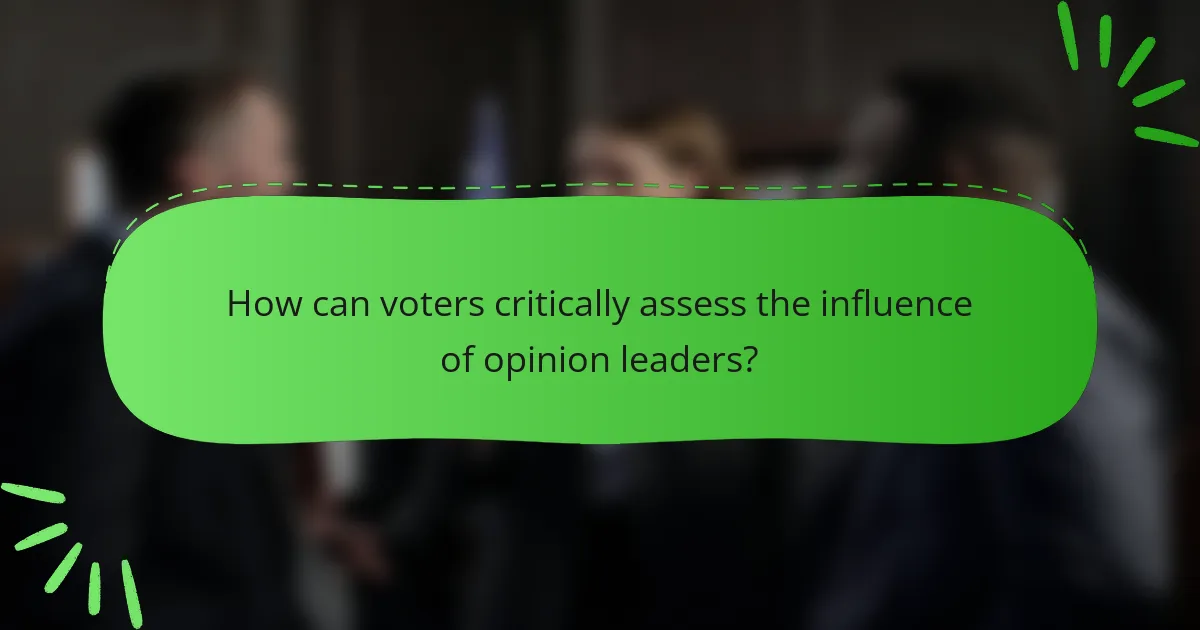Opinion leaders are individuals who influence public sentiment during elections by shaping perceptions and guiding opinions within their communities. They possess credibility and expertise, allowing them to amplify messages from political candidates and parties. Various types of opinion leaders, including political activists, media personalities, and community leaders, play significant roles in mobilizing voters and shaping public discourse. Research shows that voters are more likely to trust information from opinion leaders they admire, which can lead to shifts in voting behavior. Voters can critically assess the influence of these leaders by evaluating their credibility, motives, and the consistency of their messages with verified facts.

How do opinion leaders influence public sentiment during elections?
Opinion leaders influence public sentiment during elections by shaping perceptions and guiding opinions within their communities. They often possess credibility and expertise in specific areas, which allows them to sway the views of others. Research indicates that opinion leaders can amplify messages from candidates and parties, making them more relatable to the public. For example, during the 2020 U.S. presidential election, social media influencers played a significant role in mobilizing young voters. Their endorsements and discussions about candidates reached millions, impacting voter turnout. Studies show that individuals are more likely to trust information shared by someone they admire or respect. This trust can translate into shifts in voting behavior and preferences. Thus, opinion leaders serve as crucial intermediaries between political messages and the electorate.
What roles do opinion leaders play in shaping electoral outcomes?
Opinion leaders significantly influence electoral outcomes by shaping public perceptions and attitudes. They serve as trusted sources of information within their communities. These individuals have the ability to sway undecided voters through their endorsements. Research shows that opinion leaders can amplify political messages effectively. They often engage in discussions that frame the narrative around candidates and issues. Studies indicate that their recommendations can lead to increased voter turnout. For example, a study by the Pew Research Center found that 68% of voters trust information from their social circles more than traditional media. Therefore, opinion leaders play a crucial role in mobilizing support and shaping electoral results.
How do opinion leaders establish credibility among voters?
Opinion leaders establish credibility among voters by demonstrating expertise and trustworthiness. They often share accurate information and insights on political issues. This knowledge helps them gain the respect of their audience. Additionally, they engage with voters through social media and public forums. By actively participating in discussions, they build rapport with their followers. Consistency in their messaging reinforces their reliability. Research shows that voters are more likely to trust leaders who have a history of accurate predictions and informed opinions. This trust is crucial during election cycles, as it influences voter decisions.
What methods do opinion leaders use to communicate their views?
Opinion leaders communicate their views through various methods, including social media, public speaking, and traditional media. Social media platforms allow them to reach large audiences quickly and interactively. Public speaking engagements enable them to share insights directly with specific groups. Traditional media, such as television and newspapers, provides a broader reach and credibility. These methods are effective in shaping public sentiment, especially during elections. Research shows that opinion leaders significantly influence voter perceptions and decisions.
Why is the role of opinion leaders critical in election periods?
Opinion leaders are critical in election periods because they influence public opinion and voter behavior. They serve as trusted sources of information for their communities. Their endorsements can significantly sway undecided voters. Research shows that 70% of voters trust information from opinion leaders over traditional media. Opinion leaders often have strong social networks, amplifying their messages. They help clarify complex political issues, making them more accessible. Their role fosters engagement and encourages participation in the electoral process. Ultimately, opinion leaders shape the narrative surrounding candidates and policies during elections.
How do opinion leaders impact voter behavior?
Opinion leaders significantly influence voter behavior through their ability to shape perceptions and attitudes. They are trusted individuals within communities who provide information and opinions on political matters. Their endorsements can sway undecided voters and reinforce existing beliefs among supporters. Research shows that voters often rely on opinion leaders for guidance, especially in complex political environments. For example, a study by the Pew Research Center found that 60% of voters trust information from local leaders more than from traditional media sources. This trust can lead to increased voter turnout and engagement. Opinion leaders also facilitate discussions that help clarify issues, making them more relatable to the general public. Their impact is particularly strong in social networks, where they can amplify messages quickly.
What psychological factors make opinion leaders effective?
Opinion leaders are effective due to their credibility, social influence, and ability to connect with their audience. Credibility stems from their expertise and trustworthiness. Audiences perceive them as knowledgeable, which enhances their persuasive power. Social influence allows opinion leaders to shape attitudes and behaviors within their networks. They often serve as role models, guiding others in decision-making. Additionally, their communication skills facilitate relatable messaging. Research shows that opinion leaders can significantly sway public opinion, particularly during elections. For instance, a study by Katz and Lazarsfeld demonstrated that opinion leaders impact voter preferences more than traditional media. This highlights their critical role in shaping public sentiment.

What types of opinion leaders are prominent during elections?
Prominent types of opinion leaders during elections include political activists, media personalities, and community leaders. Political activists often drive grassroots movements and mobilize voters. Media personalities, such as journalists and commentators, shape public discourse through their platforms. Community leaders, including local officials and influential figures, guide public opinion within their networks. Research shows that these leaders significantly impact voter behavior and engagement. For instance, a study by the Pew Research Center indicates that individuals are more likely to trust information from leaders they know personally or follow closely.
How do traditional media figures act as opinion leaders?
Traditional media figures act as opinion leaders by influencing public perceptions and attitudes. They have established credibility and reach through their platforms. Their commentary shapes the narrative around political issues. This can sway public opinion during elections. Research shows that audiences often turn to these figures for guidance on complex topics. For example, a Pew Research Center study found that 61% of Americans trust news from local television. This trust enhances their role as opinion leaders. Their endorsements can significantly impact voter behavior.
What influence do journalists and news anchors have on public opinion?
Journalists and news anchors significantly influence public opinion through their reporting and commentary. They shape narratives by selecting which stories to cover and how to present them. This selection process can highlight specific issues while downplaying others. For instance, a study by the Pew Research Center found that 62% of Americans believe that news organizations influence political opinions. Journalists also frame news in ways that affect audience perceptions. The language and tone used can evoke emotional responses, swaying public sentiment. Furthermore, news anchors often serve as trusted figures, with many viewers relying on them for information. This trust can amplify their influence, as audiences may accept their perspectives without critical analysis.
How does social media amplify the voices of opinion leaders?
Social media amplifies the voices of opinion leaders by providing a platform for widespread communication. These leaders can share their insights and perspectives instantly with a large audience. The interactive nature of social media allows for real-time engagement and feedback. This creates a cycle where their opinions can be rapidly disseminated and discussed. For example, a tweet from an opinion leader can reach thousands in seconds. Studies show that social media posts from influential figures significantly impact public opinion. According to research by the Pew Research Center, 69% of adults use social media, making it a vital tool for opinion leaders. Their reach and influence are magnified through shares, likes, and comments. This dynamic fosters a stronger connection between opinion leaders and the public.
What characteristics define successful opinion leaders?
Successful opinion leaders possess strong communication skills. They articulate ideas clearly and persuasively. They have expertise in their area, which builds credibility. Successful opinion leaders are often well-connected within their networks. They engage actively with their followers, fostering trust and loyalty. Their ability to adapt messages to different audiences enhances their influence. Research shows that opinion leaders are typically seen as relatable and approachable. These characteristics enable them to effectively shape public sentiment during elections.
How do personal attributes affect an opinion leader’s impact?
Personal attributes significantly influence an opinion leader’s impact. These attributes include credibility, expertise, and relatability. Credibility enhances trust among followers, leading to greater influence. Expertise in a specific field allows opinion leaders to provide valuable insights. Relatability fosters a connection with the audience, making messages more persuasive. Research indicates that opinion leaders with high credibility can sway public opinion more effectively. For instance, a study by the Pew Research Center found that credible figures can increase message acceptance by up to 75%. Therefore, personal attributes are crucial in determining how effectively opinion leaders can shape public sentiment during elections.
What strategies do effective opinion leaders employ to engage their audience?
Effective opinion leaders engage their audience through active communication, authenticity, and tailored messaging. They utilize social media platforms to reach a wider audience quickly. Engagement is fostered by responding to audience feedback and questions promptly. Authenticity builds trust; leaders share personal stories and experiences. Tailored messaging ensures content resonates with specific demographics. They often employ storytelling techniques to make complex issues relatable. Additionally, collaboration with other influencers amplifies their message. Research indicates that opinion leaders significantly impact voter behavior and perceptions during elections.

How can voters critically assess the influence of opinion leaders?
Voters can critically assess the influence of opinion leaders by evaluating their credibility and motives. This involves researching the background and expertise of the opinion leaders. Voters should consider the sources of information these leaders provide. Analyzing the consistency of their messages with verified facts is essential. Observing the potential biases of opinion leaders helps in understanding their influence. Voters can compare the viewpoints of multiple opinion leaders to gain a balanced perspective. Engaging in discussions with peers about the opinions shared can further clarify their impact. Research indicates that informed voters are better equipped to discern the influence of opinion leaders (Pew Research Center, 2020).
What tools can voters use to evaluate the credibility of opinion leaders?
Voters can use fact-checking websites to evaluate the credibility of opinion leaders. Websites like Snopes and FactCheck.org provide verified information on claims made by public figures. Voters can also analyze the sources of information shared by opinion leaders. Reliable sources typically include reputable news organizations and academic institutions. Social media platforms often display verification badges for credible accounts. Voters should consider the track record of opinion leaders in providing accurate information. Historical data shows that opinion leaders with consistent accuracy are more trustworthy. Engaging in discussions and seeking diverse viewpoints can also help voters assess credibility.
How can fact-checking resources assist voters in discerning truth?
Fact-checking resources assist voters in discerning truth by providing verified information about claims made during elections. These resources evaluate the accuracy of statements from candidates and political ads. They help identify misinformation and clarify complex issues. For example, organizations like PolitiFact and FactCheck.org analyze statements and rate their truthfulness. Studies show that fact-checking can reduce the spread of false information. Voters who engage with these resources are more informed about candidates’ positions. This informed electorate can lead to more responsible voting decisions.
What role does media literacy play in understanding opinion leadership?
Media literacy is essential for understanding opinion leadership. It enables individuals to critically analyze media messages and identify credible sources. Opinion leaders often influence public sentiment through media channels. Without media literacy, individuals may accept misinformation from these leaders. Research shows that informed citizens are better at discerning bias and manipulation in media. This discernment helps them evaluate the impact of opinion leaders on elections. Higher media literacy correlates with increased engagement in political discourse. Thus, media literacy directly enhances the ability to understand and assess the role of opinion leaders in shaping public opinion during elections.
What best practices can voters adopt to navigate opinion leadership during elections?
Voters can adopt several best practices to navigate opinion leadership during elections. First, they should critically evaluate the sources of information. Reliable sources often have a track record of accuracy and transparency. Second, voters should seek diverse perspectives. Engaging with multiple viewpoints helps to create a well-rounded understanding of issues. Third, fact-checking claims is essential. Organizations like FactCheck.org provide tools to verify the accuracy of statements made by opinion leaders. Fourth, voters should be aware of biases in media and social platforms. Understanding these biases can help voters discern the intent behind information shared. Fifth, participating in discussions with peers can clarify opinions and reduce the influence of dominant voices. Lastly, voters should prioritize their values and beliefs when making decisions. This personal alignment aids in resisting undue influence from opinion leaders.
How can voters diversify their information sources to form balanced opinions?
Voters can diversify their information sources by seeking a variety of media outlets. This includes reading newspapers, watching television news, and following online news platforms. Engaging with different political perspectives is crucial. Voters should explore sources that present opposing viewpoints. Social media can also be a valuable tool for discovering diverse opinions. Participating in community discussions or forums allows voters to hear from others. Additionally, following expert analyses and studies can provide deeper insights. Research indicates that exposure to multiple viewpoints enhances critical thinking. A study by the Pew Research Center shows that diversified media consumption leads to more informed opinions.
What steps can voters take to engage with opinion leaders constructively?
Voters can engage with opinion leaders constructively by initiating respectful dialogue. This involves reaching out through social media or public forums. Voters should share their perspectives clearly and concisely. Providing factual information or personal experiences can enhance the conversation. Listening actively to opinion leaders’ viewpoints is crucial for mutual understanding. Voters can also ask open-ended questions to encourage deeper discussions. Collaborating on community initiatives can strengthen relationships with opinion leaders. Finally, expressing appreciation for their influence fosters a positive environment for ongoing engagement.
The main entity of this article is opinion leaders and their influence on public sentiment during elections. The article explores how opinion leaders shape voter perceptions, establish credibility, and mobilize support through various communication methods, including social media and traditional media. It highlights the critical role these leaders play in electoral outcomes by swaying undecided voters and reinforcing existing beliefs. Additionally, the article discusses the psychological factors that enhance their effectiveness, the characteristics of successful opinion leaders, and strategies voters can adopt to critically assess their influence and engage constructively.